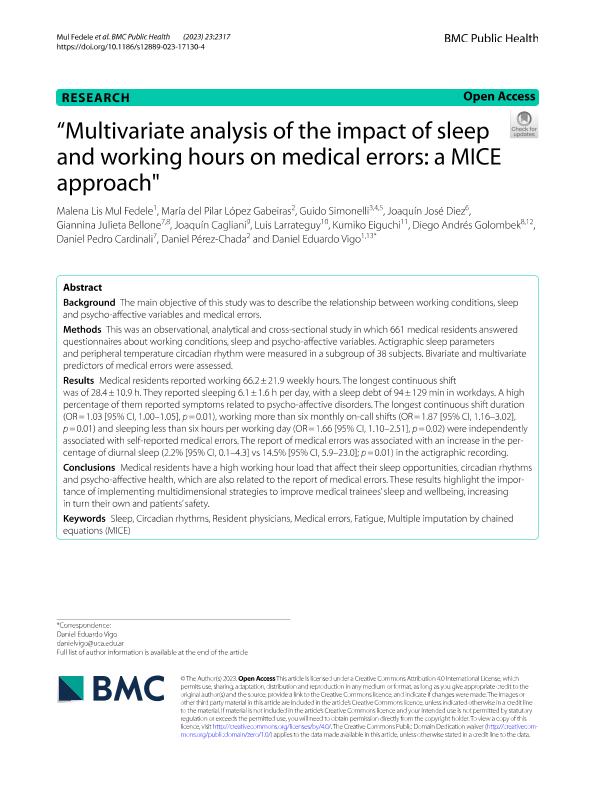Artículo
Multivariate analysis of the impact of sleep and working hours on medical errors: A MICE approach
Mul Fedele, Malena Lis ; López Gabeiras, María del Pilar; Simonelli, Guido; Diez, Joaquín José
; López Gabeiras, María del Pilar; Simonelli, Guido; Diez, Joaquín José ; Bellone, Giannina Julieta; Cagliani, Joaquín; Larrateguy, Luis Darío; Eiguchi, Kumiko; Golombek, Diego Andrés; Cardinali, Daniel Pedro
; Bellone, Giannina Julieta; Cagliani, Joaquín; Larrateguy, Luis Darío; Eiguchi, Kumiko; Golombek, Diego Andrés; Cardinali, Daniel Pedro ; Pérez Chada, Daniel; Vigo, Daniel Eduardo
; Pérez Chada, Daniel; Vigo, Daniel Eduardo
 ; López Gabeiras, María del Pilar; Simonelli, Guido; Diez, Joaquín José
; López Gabeiras, María del Pilar; Simonelli, Guido; Diez, Joaquín José ; Bellone, Giannina Julieta; Cagliani, Joaquín; Larrateguy, Luis Darío; Eiguchi, Kumiko; Golombek, Diego Andrés; Cardinali, Daniel Pedro
; Bellone, Giannina Julieta; Cagliani, Joaquín; Larrateguy, Luis Darío; Eiguchi, Kumiko; Golombek, Diego Andrés; Cardinali, Daniel Pedro ; Pérez Chada, Daniel; Vigo, Daniel Eduardo
; Pérez Chada, Daniel; Vigo, Daniel Eduardo
Fecha de publicación:
12/2023
Editorial:
BioMed Central
Revista:
BMC Public Health
ISSN:
1471-2458
Idioma:
Inglés
Tipo de recurso:
Artículo publicado
Clasificación temática:
Resumen
Background: The main objective of this study was to describe the relationship between working conditions, sleep and psycho-affective variables and medical errors. Methods: This was an observational, analytical and cross-sectional study in which 661 medical residents answered questionnaires about working conditions, sleep and psycho-affective variables. Actigraphic sleep parameters and peripheral temperature circadian rhythm were measured in a subgroup of 38 subjects. Bivariate and multivariate predictors of medical errors were assessed. Results: Medical residents reported working 66.2 ± 21.9 weekly hours. The longest continuous shift was of 28.4 ± 10.9 h. They reported sleeping 6.1 ± 1.6 h per day, with a sleep debt of 94 ± 129 min in workdays. A high percentage of them reported symptoms related to psycho-affective disorders. The longest continuous shift duration (OR = 1.03 [95% CI, 1.00–1.05], p = 0.01), working more than six monthly on-call shifts (OR = 1.87 [95% CI, 1.16–3.02], p = 0.01) and sleeping less than six hours per working day (OR = 1.66 [95% CI, 1.10–2.51], p = 0.02) were independently associated with self-reported medical errors. The report of medical errors was associated with an increase in the percentage of diurnal sleep (2.2% [95% CI, 0.1–4.3] vs 14.5% [95% CI, 5.9–23.0]; p = 0.01) in the actigraphic recording. Conclusions: Medical residents have a high working hour load that affect their sleep opportunities, circadian rhythms and psycho-affective health, which are also related to the report of medical errors. These results highlight the importance of implementing multidimensional strategies to improve medical trainees’ sleep and wellbeing, increasing in turn their own and patients’ safety.
Archivos asociados
Licencia
Identificadores
Colecciones
Articulos(BIOMED)
Articulos de INSTITUTO DE INVESTIGACIONES BIOMEDICAS
Articulos de INSTITUTO DE INVESTIGACIONES BIOMEDICAS
Citación
Mul Fedele, Malena Lis; López Gabeiras, María del Pilar; Simonelli, Guido; Diez, Joaquín José; Bellone, Giannina Julieta; et al.; Multivariate analysis of the impact of sleep and working hours on medical errors: A MICE approach; BioMed Central; BMC Public Health; 23; 1; 12-2023; 1-14
Compartir
Altmétricas



